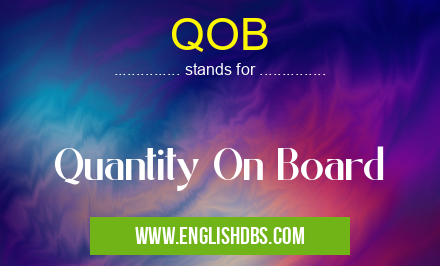What does QOB mean in UNCLASSIFIED
QOB stands for Quantity On Board. It is a term used in various industries, particularly in logistics, shipping, and inventory management, to represent the total amount of a particular commodity or product that is currently available and held in storage or on a specific vessel or vehicle. QOB is a crucial metric for tracking inventory levels, managing supply chains, and ensuring the availability of goods.

QOB meaning in Unclassified in Miscellaneous
QOB mostly used in an acronym Unclassified in Category Miscellaneous that means Quantity On Board
Shorthand: QOB,
Full Form: Quantity On Board
For more information of "Quantity On Board", see the section below.
Importance of QOB
Accurate QOB information is essential for several reasons:
- Inventory Management: QOB helps businesses maintain optimal inventory levels, avoiding shortages or surpluses.
- Supply Chain Optimization: Accurate QOB data enables companies to plan transportation and logistics operations efficiently, reducing lead times and minimizing costs.
- Sales Forecasting: QOB can be used to forecast sales trends and project future demand, ensuring that businesses have adequate inventory to meet customer requirements.
- Customer Service: Knowing the QOB of a product allows businesses to provide accurate information to customers regarding availability and delivery times.
- Regulatory Compliance: In certain industries, QOB may be required for regulatory reporting or compliance purposes.
QOB Measurement
QOB is typically measured in units of quantity, such as:
- Weight (e.g., pounds, kilograms)
- Volume (e.g., liters, gallons)
- Number of items (e.g., units, pieces)
The specific unit of measurement used depends on the industry and the nature of the product being tracked.
QOB Management
Effective QOB management involves:
- Regular Inventory Audits: Conducting regular inventory audits helps ensure the accuracy of QOB data.
- Real-Time Tracking: Utilizing inventory management systems that provide real-time QOB updates can enhance efficiency.
- Demand Forecasting: Regularly forecasting demand patterns can help businesses anticipate future QOB needs and adjust inventory levels accordingly.
- Safety Stock: Maintaining a safety stock of essential products can buffer against unexpected fluctuations in demand or supply.
- Collaboration: Collaborating with suppliers and customers on QOB information can improve supply chain visibility and coordination.
Final Words: QOB is a critical metric that plays a significant role in inventory management, supply chain optimization, and customer service. Accurate and timely QOB data enables businesses to make informed decisions, avoid disruptions, and meet customer demands effectively. By implementing effective QOB management practices, organizations can optimize their operations, reduce costs, and improve overall business efficiency.
